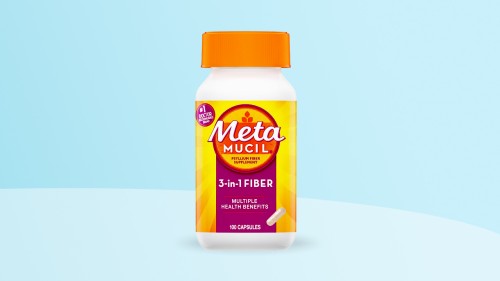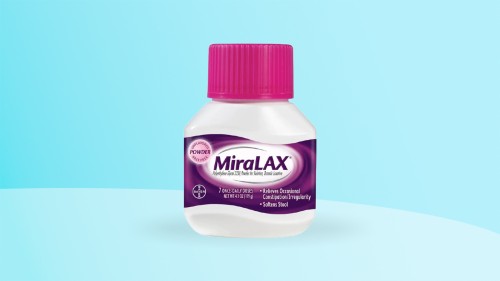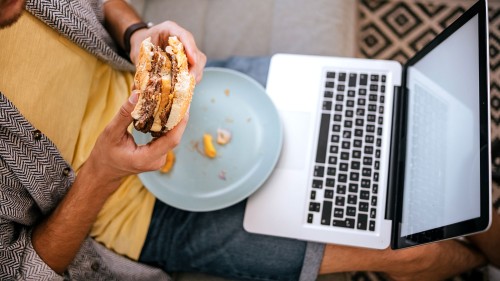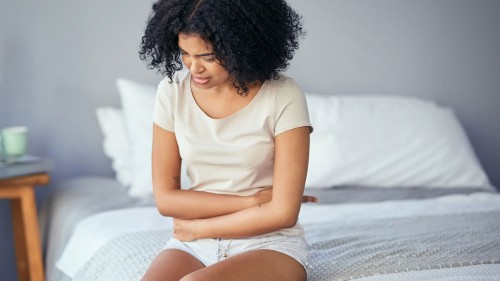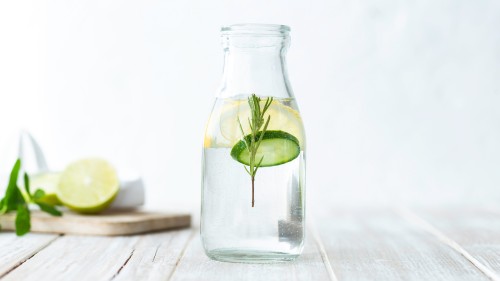How to Get Rid of Constipation: Home Remedies and When to See a Doctor
Published on November 11, 2021
Medically Reviewed by Ana Reisdorf, MS, RD
Constipation is a common problem that affects almost everyone at some point in time. In this article you can read about constipation remedies you can use to treat mild cases at home, and learn when it’s best to see a doctor.


Most people experience constipation from time to time. Statistics show that gastrointestinal disorder affects 16% of all adults and 33% of adults over 60. (1)
When constipation is mild and occasional, and if lifestyle factors are the cause, it can usually be remedied at home.
However, there are other instances when constipation should be managed by qualified health care professionals.
It’s important to know when self-care is appropriate, how to administer self-care, and when it’s best to see a doctor.
Causes of Constipation
Constipation is sometimes self-inflicted. It can be caused by factors that can be controlled with lifestyle changes. These factors include:
- Sedentary lifestyle
- Poor diet and lack of fiber
- Dehydration
- Stress
- Travel and other disruptions to routine
- Postponing going to the bathroom when the body signals it’s time
Some conditions outside of lifestyle can cause constipation. When these conditions are present, gastrointestinal problems should be managed with help from a doctor.
Home remedies may delay relief or make the problem worse. These conditions include:
- Medical conditions like diabetes, Parkinson’s disease, multiple sclerosis, irritable bowel syndrome (IBS), or recovery from stroke
- Hormone-affecting conditions like pregnancy, diabetes, and hypothyroidism
- Taking certain medications like opioid pain control, blood pressure medications, and antidepressant medications
- Problems with the pelvic floor muscles
- Obstructions in the intestine
Summary
Constipation can be caused by either lifestyle factors, conditions that lead to constipation, or both. Some cases of constipation should be treated by healthcare professionals.
Symptoms
Though constipation is commonly defined as having stools less often than three times each week, the American College of Gastroenterology (ACG) recognizes that infrequent bowel movements are normal for some people.
Instead, ACG bases constipation on symptoms including “unsatisfactory bowel movements with infrequent stools, or difficult stool passage, or both.”
People with constipation may experience:
- Not being able to pass stool as often as they usually do
- Gas and bloating
- Having to strain when passing stool
- Having hard or lumpy stools
- A feeling of not being able to poop
- A sensation of the bowel not being emptied after using the bathroom
These symptoms are typically uncomfortable, but if more than mild gas pain is experienced, it’s time to see a doctor.
Summary
Symptoms of constipation are uncomfortable. If you experience consistent pain, it’s time to see a doctor.
How to Help Constipation at Home
If it isn’t severe, it may be possible to get constipation relief by treating it at home. The key is to stay on top of gut maintenance.
These constipation remedies may get to the root of the problem and help with regularity so that it doesn’t happen again.
1. Get Hydrated
Sometimes constipation is a simple dehydration issue. Some people, including many older adults, have a diminished sense of thirst, which puts them at higher risk for constipation.
It’s estimated that 17%–28% of older adults are dehydrated. (2)
When digested food reaches the large intestine, water from the food is absorbed into the body, leaving the stool in a more solid, formed state.
When we don’t get enough liquids, the result is hard, lumpy stools that don’t easily slide through the intestine as our involuntary muscles try to push it through.
The National Academies of Sciences, Engineering, and Medicine recommends: (3)
- 11.5 cups of fluids daily for women
- 15.5 cups of fluids daily for men
This recommendation can include water, juice, coffee, tea, and even juicy fruits and vegetables like kiwifruit, celery, melon, lettuce, strawberries, oranges, and cucumbers.
Summary
Staying hydrated can help move stool smoothly and easily through the intestines.
2. Add fiber
About 90%–97% of Americans don’t get the recommended 25–38 grams of fiber daily, which comes from fruits, vegetables, and whole grains. (4, 5)
Constipation can be one side effect of not getting enough fiber.
Fiber is any carbohydrate that we can’t digest and absorb into the body, which means those molecules stay in our digestive tract from the time we put it in our mouths until they’re digested by our gut microbiome, or until we have a bowel movement.
There are two kinds of fiber — soluble and insoluble.
Soluble fiber absorbs water, which causes stool to swell and become a gel-like material. As a result, the stool retains more water and may be softer and easier to pass. Good sources of soluble fiber include oatmeal, apples, peas, and beans.
Insoluble fiber does not absorb water; it adds sheer bulk to your stool and can increase stool frequency. (6) Good sources of insoluble fiber include whole wheat, beans, nuts, potatoes, and green beans.
Keep in mind that getting enough liquid with fiber intake is essential. Research shows that proper hydration enhances the effect of fiber. (7)
Many fruits and vegetables have naturally high liquid content, making them excellent choices.
A high-fiber diet can also help feed the gut microbiome. Studies show that an unhealthy microbiome can contribute to constipation. (8)
Some research shows that getting too much fiber can make constipation worse. Before adding more fiber to your diet, it’s best to first evaluate if you’re already getting enough. (9)
Summary
Adding high-fiber foods like fruits, vegetables, and whole grains to your diet may help constipation if you’re not getting enough. Including plenty of liquid with your high-fiber diet is essential.
3. Include Foods with Laxative Components
In addition to the fiber they contain, some plant-based foods naturally contain chemicals that may relieve and prevent constipation.
Coincidentally, these foods are also high in other nutrients, which means routinely including them in your diet does more than just improve regularity.
- Sorbitol: Sugar alcohols, including sorbitol, are used as alternative sweeteners and as laxatives in medicine. Sorbitol can be naturally found in the whole fruit and juices of prunes, apricots, pears, peaches, nectarines, and apples. (10)
- Actinidin: This enzyme appears to fight constipation by assisting with protein digestion. The molecule seems to decrease the time it takes to digest food and reduces bloating. Actinidin is abundantly found in green kiwifruit. (11)
- Naringenin: Naringenin is a flavonoid, a chemical found in plants with anti-inflammatory, immune-boosting, and anti-constipation properties. Naringenin has also been shown to improve constipation symptoms. Grapefruit and mandarin oranges are especially high in naringenin. (12)
- Caffeine: Coffee and its stimulation of bowel movements have been the subject of several studies. One study showed that caffeinated coffee stimulated colonic activity 23% more than decaffeinated coffee. (13)
Summary
Components found in some plant-based foods have been shown to help alleviate constipation.
4. Move and Massage Your Body
Exercise is the key to improving and preventing many health problems, including constipation.
A systematic review of nine studies and 680 participants in 2019 showed positive associations between exercise and constipation relief. (14)
Moving the body with vigorous exercise stimulates the colon to work and improves colonic transit time (CTT). (15)
In addition, strengthening abdominal wall muscles can help tone muscles needed while the body is passing stool.
Abdominal massage therapy, which can be self-administered and gently follows the natural path of stool along the ascending, transverse, and descending colon, also improves CTT. (16)
A study in 2019 involving 220 adults over the age of 65 showed that massaging the abdomen daily can improve symptoms in constipated people.
Summary
Movement can matter when it comes to constipation. Both exercise and self-massage of the abdomen have been shown to improve CTT.
5. Choose Prebiotic Foods
Prebiotics are components in foods that feed the good bacteria in the gut microbiome. Some prebiotic foods have been shown to help with constipation, primarily if it’s unrelated to IBS.
- Inulin has been shown to improve constipation symptoms. It’s found in asparagus, chicory, garlic, Jerusalem artichokes, leeks, oats, onions, and soybeans. (17)
- Pectin is a soluble fiber that feeds probiotic bacteria Bifidobacterium and Lactobacillus. Pectin can be found in apples and citrus fruit. (18)
People who suffer from IBS may find that certain prebiotics worsen their gastrointestinal problems. These patients may benefit from a FODMAPs diet, which eliminates many foods.
IBS patients should check with their doctor before increasing prebiotics to their constipation-relief routine.
Summary
Prebiotic foods may help feed the good bacteria in the gut microbiome, improving constipation in some people. However, some types of constipation may worsen with prebiotics.
6. Include Probiotic Foods
Probiotics are beneficial microbes that positively affect human health when consumed in adequate amounts. They have been shown in several studies to improve gut health, including preventing and treating constipation. (19)
Probiotics can be taken in supplement form, or people can get them from fermented probiotic foods. These foods include:
- Kefir (liquid fermented goat, sheep, or cow’s milk)
- Kombucha (fermented tea)
- Sauerkraut (fermented cabbage)
- Miso (fermented soybeans)
- Pickles (fermented cucumbers)
When shopping for probiotic foods, be sure to read the labels. Viable probiotic foods usually advertise that they contain live and active cultures in the product.
Summary
Probiotic foods can be found in most grocery stores. Look for active and live cultures on the product label.
7. When You’ve Got to Go, GO!
Let’s face it. Sometimes it’s just not convenient to have a bowel movement.
Some people avoid using public restrooms when they’re away from home for various reasons. Other people feel too busy at times to take a break.
This avoidance can cause or worsen constipation. Delaying allows more water to be drawn out of the stool and into the body, making the stool drier and harder to pass.
In addition, stool can get compressed and backed up in the rectum. This can lead to gas to back up behind the mass, painful bloating, and even leakage of liquid fecal matter around the hardened stool.
Listen to your body and find a way to use the restroom when it’s time. If this is a constant problem, consider why there is avoidance and plan for possible solutions.
Summary
Constipation can be caused or worsened by not using the bathroom when the body signals that it’s time.
8. Foods You May Need to Avoid
Most people experience some type of food intolerance in their lives, even to foods that are considered healthy and nutrient-dense.
Constipation may be a signal that your body is not tolerating certain foods at this time.
Fruits high in tannic acid can inhibit the release of chemicals that cause the intestinal muscles to push food through the gut. These fruits include bananas and persimmons, especially if they’re unripe. (20)
For some people, including young children, dairy products can cause constipation, especially if they eat more than what’s recommended. (21)
Because dairy is often a common source of nutrients like calcium, it’s important to find replacement foods if they’re eliminated from the diet.
Some people find relief from constipation by eliminating FODMAPs from their diet. FODMAP stands for fermentable oligosaccharides, disaccharides, monosaccharides, and polyols. These are carbohydrates found in many foods typically recommended in the diet.
Consult your doctor or registered dietitian to learn if this particular diet is a good idea for you.
Keep in mind that, unlike true allergies, intolerances may be temporary. A dietitian can guide you on how to reintroduce food safely, especially if they’re foods you enjoy or if they’re high in nutrients that you may not otherwise get in your diet.
Summary
Some nutrient-dense foods may worsen constipation for some people. Your doctor or dietitian should recommend alternative foods to ensure you’re getting enough nutrients in your diet.
When to Seek Medical Help
Sometimes home remedies aren’t enough to treat constipation.
Those who have been following a healthy lifestyle, including plenty of dietary fiber, fluids, and exercise, should make an appointment with their doctor if they are still experiencing constipation.
A consultation is necessary to rule out underlying conditions that may be causing the problem.
The American Gastroenterological Association recommends examining stools each time before flushing and seeing a doctor if:
- Pain is severe
- Constipation lasts longer than three weeks
- Stools are consistently thinner than normal
- Along with constipation symptoms, you start losing weight without trying
- Seek help immediately if you experience bloody or black-colored stools
Summary
When self-care at home isn’t enough, seek help from a qualified doctor or gastroenterologist. Some symptoms accompanying constipation warrant an immediate visit.
Frequently Asked Questions
I normally have bowel movements about three times a week. Does that mean I’m constipated?
Not necessarily. If you feel good, your stools are soft, and you’re not experiencing a lot of uncomfortable bloating and gas, you may not be constipated.
For some people, infrequent bowel movements are perfectly normal. However, sudden changes in bowel frequency could be a sign of a problem.
What foods can make me constipated?
Toleration of foods and how they affect bowel movements can vary significantly from person to person.
For example, some people are sensitive to gluten and should avoid wheat, rye, and barley products.
For people who are easily constipated, drinks that are dehydrating, like alcohol and even coffee, can exacerbate the problem.
Foods with tannic acid like bananas and persimmons can also change the gut chemistry and cause constipation, especially when they're not ripe.
Finally, eating too many refined grains like white bread instead of whole grains may prevent people from meeting fiber recommendations.
What medicine should I use to relieve constipation?
If your constipation persists and you can’t get relief without medicine, it’s a good idea to make an appointment with your doctor for medication recommendations.
Your doctor will be able to determine which medications or supplements are best for your condition. Choosing the wrong medications or using them too often may make the problem worse.
Should I stop eating if I’m constipated?
If you feel like eating, the right foods may help the problem.
Drink lots of fluids, including water, fruit juices, and soups, and choose high fiber foods like raw fruits and vegetables and whole grains like oatmeal to get things moving.
If the discomfort from constipation is so bad that you’ve lost your appetite, it may be time to get help from the doctor.
What exercises are best for constipation?
Any kind of exercise may help, but some people find relief from exercises that involve jostling or pushing on the gut.
Running, biking, skipping, and yoga positions like child’s pose or supta masayendrasana may help relieve gas and bloating and stimulate the bowels to get moving.
Be sure to stay near a restroom while you’re exercising. If you feel the urge to go, go right away.
The Bottom Line
Constipation can sometimes be caused by interruptions in a healthy eating and lifestyle plan.
When lifestyle changes are the cause, sometimes home remedies can alleviate the problem. This includes eating the right healthy foods, drinking plenty of fluids, and getting regular exercise.
Constipation caused by underlying conditions should be managed by a healthcare team.
Persistent constipation and certain symptoms that may accompany constipation should not be ignored, and sufferers should seek help from a doctor.
At WellnessVerge, we only use reputable sources, including peer-reviewed medical journals and well-respected academic institutions.
- American Gastroenterological Association Medical Position Statement on Constipation:
https://www.gastrojournal.org/article/S0016-5085(12)01545-4/fulltext?referrer=https%3A%2F%2Fpubmed.ncbi.nlm.nih.gov%2F - Adult Dehydration:
https://www.ncbi.nlm.nih.gov/books/NBK555956/ - Dietary Reference Intakes for Electrolytes And Water:
https://www.nationalacademies.org/our-work/dietary-reference-intakes-for-electrolytes-and-water - Dietary Guidelines for Americans, 2020-2025:
https://www.dietaryguidelines.gov/sites/default/files/2020-12/Dietary_Guidelines_for_Americans_2020-2025.pdf - Dietary Reference Intakes (DRIs): Recommended Dietary Allowances and Adequate Intakes, Total Water and Macronutrients:
https://www.ncbi.nlm.nih.gov/books/NBK56068/table/summarytables.t4/?report=objectonly - Effect of dietary fiber on constipation: a meta analysis:
https://pubmed.ncbi.nlm.nih.gov/23326148/ - Water supplementation enhances the effect of high-fiber diet on stool frequency and laxative consumption in adult patients with functional constipation:
https://pubmed.ncbi.nlm.nih.gov/9684123/ - Gut Microbiota and Chronic Constipation: A Review and Update:
https://www.ncbi.nlm.nih.gov/pmc/articles/PMC6379309/ - Stopping or reducing dietary fiber intake reduces constipation and its associated symptoms:
https://www.ncbi.nlm.nih.gov/pmc/articles/PMC3435786/ - National Institutes of Health: Sorbitol:
https://www.ncbi.nlm.nih.gov/pmc/articles/PMC6693595/ - Putative mechanisms of kiwifruit on maintenance of normal gastrointestinal function:
https://www.tandfonline.com/doi/full/10.1080/10408398.2017.1327841 - Naringenin induces laxative effects by upregulating the expression levels of c-Kit and SCF, as well as those of aquaporin 3 in mice with loperamide-induced constipation:
https://www.ncbi.nlm.nih.gov/pmc/articles/PMC5752176/ - Is coffee a colonic stimulant?:
https://pubmed.ncbi.nlm.nih.gov/9581985/ - Exercise therapy in patients with constipation: a systematic review and meta-analysis of randomized controlled trials:
https://pubmed.ncbi.nlm.nih.gov/30843436/ - Aerobic exercise improves gastrointestinal motility in psychiatric inpatients:
https://www.ncbi.nlm.nih.gov/pmc/articles/PMC4130869/ - Michigan Medicine, University of Michigan: Abdominal Self Massage:
http://www.med.umich.edu/1libr/MBCP/AbdominalSelfmassage.pdf - Effect of consumption of chicory inulin on bowel function in healthy subjects with constipation: a randomized, double-blind, placebo-controlled trial:
https://www.tandfonline.com/doi/full/10.1080/09637486.2016.1212819 - Efficacy of Synbiotics in Patients with Slow Transit Constipation: A Prospective Randomized Trial:
https://www.ncbi.nlm.nih.gov/pmc/articles/PMC5083993/ - Meta-analysis of randomized controlled trials of the effects of probiotics on functional constipation in adults:
https://pubmed.ncbi.nlm.nih.gov/32005532/ - National Institues of Health: Diets for Constipation:
https://www.ncbi.nlm.nih.gov/pmc/articles/PMC4291444/ - Intolerance of cow's milk and chronic constipation in children:
https://pubmed.ncbi.nlm.nih.gov/9770556/

